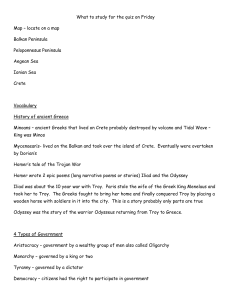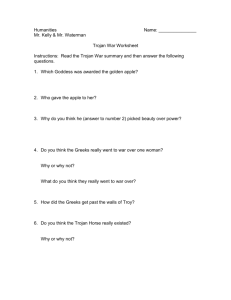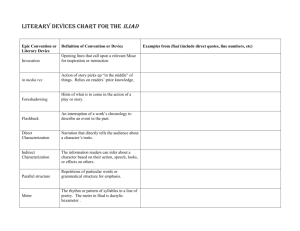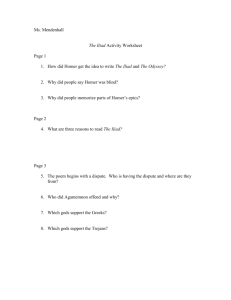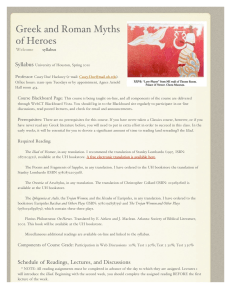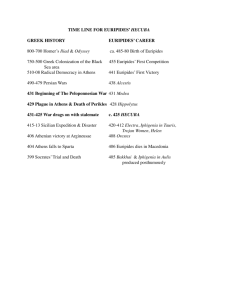here
advertisement
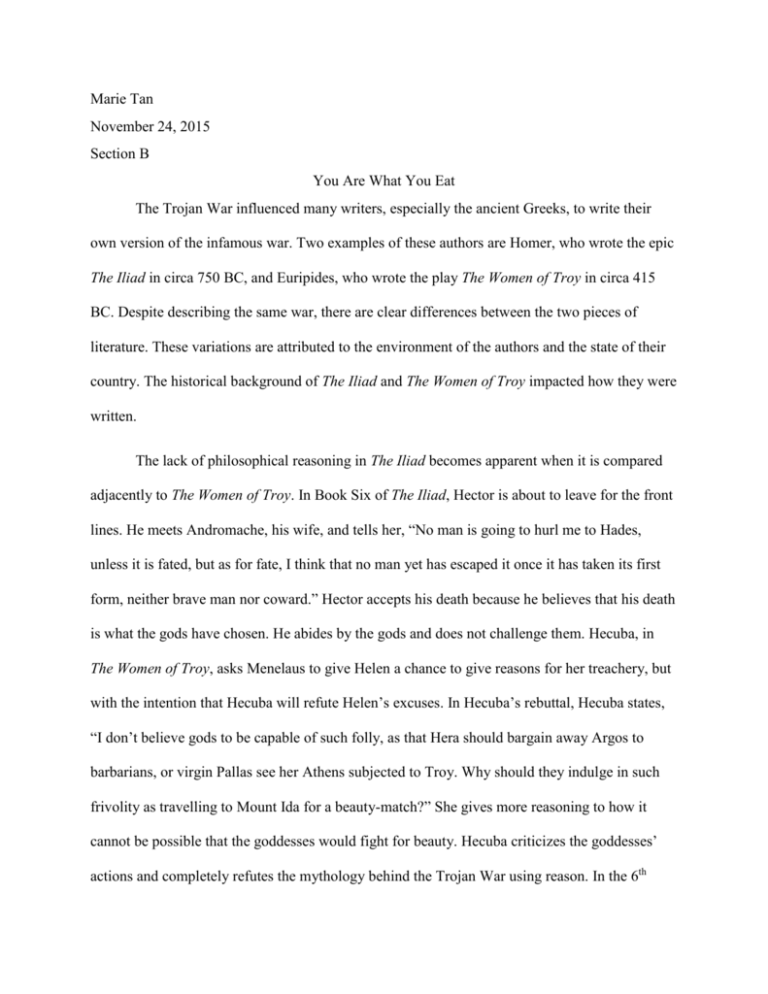
Marie Tan November 24, 2015 Section B You Are What You Eat The Trojan War influenced many writers, especially the ancient Greeks, to write their own version of the infamous war. Two examples of these authors are Homer, who wrote the epic The Iliad in circa 750 BC, and Euripides, who wrote the play The Women of Troy in circa 415 BC. Despite describing the same war, there are clear differences between the two pieces of literature. These variations are attributed to the environment of the authors and the state of their country. The historical background of The Iliad and The Women of Troy impacted how they were written. The lack of philosophical reasoning in The Iliad becomes apparent when it is compared adjacently to The Women of Troy. In Book Six of The Iliad, Hector is about to leave for the front lines. He meets Andromache, his wife, and tells her, “No man is going to hurl me to Hades, unless it is fated, but as for fate, I think that no man yet has escaped it once it has taken its first form, neither brave man nor coward.” Hector accepts his death because he believes that his death is what the gods have chosen. He abides by the gods and does not challenge them. Hecuba, in The Women of Troy, asks Menelaus to give Helen a chance to give reasons for her treachery, but with the intention that Hecuba will refute Helen’s excuses. In Hecuba’s rebuttal, Hecuba states, “I don’t believe gods to be capable of such folly, as that Hera should bargain away Argos to barbarians, or virgin Pallas see her Athens subjected to Troy. Why should they indulge in such frivolity as travelling to Mount Ida for a beauty-match?” She gives more reasoning to how it cannot be possible that the goddesses would fight for beauty. Hecuba criticizes the goddesses’ actions and completely refutes the mythology behind the Trojan War using reason. In the 6th century BC, the Greeks questioned their gods on mount Olympus. Suddenly without a justification of how the world works, the Greeks created more logical explanations of the workings of the world than what they previously believed. The philosophy that the modern world knows did not develop until Socrates introduced the Socratic Method where he emphasized on questioning and reasoning, much like what Hecuba does in her counterclaim. Socrates was a contemporary to Euripides, thus there is a plethora of evidence the influence philosophy had on The Women of Troy. Unlike Hector in The Iliad who accepts his fate and does not question the gods, Hecuba in The Women of Troy questions her whole belief by using philosophy. The author’s purpose for writing the work of literature also affected how The Iliad and The Women of Troy were written. Homer uses many epithets in The Iliad, such as “Menelaus of the great battle cry” or “gray-eyed Athene”. These epithets were employed as a result of the constraints of the rhythmic scheme in The Iliad. They were also used as a mnemonic device for the readers and the orator, making it clear that The Iliad was something to be memorized. In The Women of Troy, it is made apparent that Polyxena, one of Hecuba’s daughters, has died through the dialogue of Poseidon and Athena. When questioned about Polyxena by Hecuba, Talthybius, a Greek herald, answers evasively as he states, “She has been attendant at Achilles’ tomb.” Although Talthybius is a Greek, he shows hesitance as he answers the fate of Hecuba’s daughter, which displays a level of compassion. The story of the Trojan War was passed down from generation to generation by the use of oral tradition. It was important to be able to remember the whole epic, therefore, Homer utilized mnemonics, such as epithets, so the story will be able to be retold. In Euripides’s case, however, he resided in a time period where the best playwright would win money through a contest. He lived off of winning playwriting contests. As a result of this ambition, Euripides, like many other Greek playwrights, implemented characters like Talthybius who represents a bridge between the audience and the characters in the play. Most of the audiences at the time knew about the fate of each character in The Women of Troy, a schematic known as dramatic irony. Talthybius is a character that must give grievous messages to the women, rather evasively, and is one of the few characters in the play that knows the women’s fates. The audience identifies themselves with Talthybius, who clearly does not want to be in the position he is in. Euripides is able to create an emotional response out of the audience, thus, creating a successful play. Even the author’s purpose for writing impacted how the work was written. The tone of The Iliad and The Women of Troy are disparate because each view warfare differently. In the beginning of Book Six of the Iliad, the Greeks are in a fierce battle against the Trojans. Euralyos, a Greek, “slaughtered Opheltios and Dresos, and went in pursuit of Aisepos and Pedasos…Now Mekisteor’s son unstrung the strength of these and the limbs in their glory, Euryalos, and stripped the armor away from their shoulders.” Homer uses verbs that are animate, such as “unstrung” or “stripped”, which makes the reader feel as if they too are in the battle. The reader cannot help but feel empowered, even though The Iliad talks about slaughter. In addition, Homer gives minimal information about the emotions of the characters being killed. The Iliad focuses more on the excitement of war, rather than on the sadistic side of war, creating a tone that glorifies violence. In The Women of Troy, Andromache receives the news that her son Astyanax is to be thrown off a building to die because he is the Trojan hero Hector’s son. Andromache expresses her grief as she states to her son, “You die, at enemy hands, and leave me desolate. Your noble father’s greatness, which to other men brought hope and life and victory, will cost you your death… When you were newly born I wrapped you up, gave you my breast, tended you day and night, worn with weariness-For nothing, all for nothing! Say good-bye to me once more, for the last time all.” Euripides depicts the consequence of the son of an enemy hero, a consequence of war. Not only does he illustrate the result of Astyanax, a little boy, he also shows the motherly grief of Andromache. Unlike Homer, Euripides gives more emotion into the characters and creates a tone of the graveness of war. The difference in the tone is attributed to the time the two works were written in. Although the Trojan War took place in circa 1200 BC, several hundred years later, Homer wrote about The Iliad. When The Iliad was first written, there were no major wars that were fought by the Greeks, and most likely, the closest war in the time was the Trojan War. The Iliad thus does not show the consequences of war and its tone evidently focuses on glorifying the Greek soldiers. The play The Women of Troy, on the other hand, was written when Greece was plagued with major wars, such as the Persian War (499 to 449 BC) and the Peloponnesian War (431 to 404 BC). Instead of focusing on the physical battlefield, Euripides shifted his focus onto the repercussions of the war, more specifically, the women left behind. Because the effects of warfare are more relevant to contemporaries of Euripides than to people during Homer’s time period, the tone in The Women of Troy is devastating, with no hint of the glorification of Greek or Trojan soldiers. There is a myriad of evidence that the environment that The Iliad and The Women of Troy affected how the authors wrote the two works of literature. Although both are on the Trojan War, their emphasis on the Trojan War is very different as a result of the situation of ideas, the country, and even the authors. The fact that literature is influenced by the environment holds true for modern entertainment as well. Much like The Iliad, the film The Godfather glorifies mafia life and makes the audience wish to become a hero in the mafia like The Godfather because the audience has never been in the situation and does not know the reality of actually joining the mafia. George Orwell had a mission when he wrote dystopian novels, such as 1984 and Animal Farm; it was to educate people that a world, much like the setting Orwell wrote about, can be possible if political philosophy got out of hand. Although the mission statements for Euripides and Orwell contrast greatly, much like Euripides, modern writers, like Orwell, wrote for a purpose. Books such as 1984 or Animal Farm also indicates Orwell’s belief that totalitarian states should be prohibited because Orwell was surrounded by the Soviet Union’s and Germany’s totalitarian states and vehemently opposed the government system. Although Orwell despised tyranny, a person in countries that are authoritarian, such as North Korea, may write books on how great his or her government system is. While they are of the same species and write essentially about the same thing, they have completely different views on their topic of interest. The author’s writing style is impact by his or her environment.
